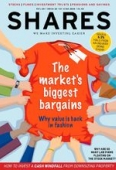Archived article
Please note that tax, investment, pension and ISA rules can change and the information and any views contained in this article may now be inaccurate.
The lowdown on Fundsmith’s popular emerging markets trust

Save for three constituents, the trusts populating the Association of Investment Companies’ (AIC) Global Emerging Markets sector trade at discounts to net asset value (NAV), while the sector average discount stands at 11.2%.
The most well-followed among retail investors among this premium-rated trio, which includes BlackRock Frontiers (BRFI) and Jupiter Emerging & Frontier Income (JEFI), is Fundsmith Emerging Equities Trust (FEET), currently trading on a 1% premium and a company increasing in size as it issues new shares to satisfy investor demand.
However, performance since inception in 2014 has been patchy with the trust struggling to match its benchmark. Does a recent uptick in performance suggest a patient approach is starting to pay off?
FEET in focus
Capital growth focused ‘FEET’ is managed by combative City figure Terry Smith, who has forged a strong track record with the open-ended, developed markets focused Fundsmith Equity Fund (GB00B4M93C53).
Unlike Fundsmith Equity however, FEET invests in companies which have the majority of their operations in, or revenues derived from, developing economies and which provide direct exposure to the rise of the consumer classes in those countries.
No-nonsense East London native Smith scours emerging markets for firms which make their money by a large number of everyday, repeat, relatively predictable transactions, a process that leads him towards consumer stocks.
Blue sky or faddish names aren’t for him; indeed, the median founding year of the 49 companies in the portfolio is 1966, so it is fair to say these are tried and tested businesses that have come through a cycle or two.
Furthermore, as the FEET literature explains, the trust puts shareholders’ funds to work with companies that have relatively predictable revenues and low capital intensity, and correspondingly high returns on capital.
‘The targeted companies will also deliver most or all of their profits in cash. They will have defensible and strong market positions, typically derived from a combination of brands, trademarks and distribution systems or networks, it says.
Significantly, about one third of the companies in which FEET can invest are quoted subsidiaries or franchisees of the multinationals in which Fundsmith Equity may invest; the advantage is that Smith is well placed to conduct due diligence and assess the corporate governance of these companies. To illustrate, holdings include Hindustan Unilever (India), Colgate Palmolive (India), Nestle Nigeria and Kimberly Clark De Mexico SAB.
QUALITY INGREDIENTS
Smith’s emphasis on sustainability of returns steers the seasoned stockpicker away from the financial sector and heavily cyclical industries such as construction, manufacturing, utilities, resources and transport.
And he unwaveringly sticks to his stated strategy of not overpaying for shares and then doing as little dealing as possible in order to minimise expenses, allowing the investee companies’ returns to compound for shareholders.
Critics will point out that FEET actually underperformed during the financial year to 31 December, with NAV total returns of 21.2% compared to 25.3% from the MSCI Emerging and Frontier Markets Index, albeit the relative underperformance against the benchmark index was lower than in previous years.
Patrick Thomas, investment manager and fund expert, Canaccord Genuity Wealth Management, scathingly comments: ‘The premium on FEET relative to its peer group defies all logic. It’s managed to underperform during a market environment that has heavily favoured the kinds of companies FEET buys with a higher OCF (ongoing charges figure) than most peers.
‘It is managed by a team with no real track record in the EM space. Yet there has never been a meaningful discount on the trust.’
Smith explains: ‘None of the top ten constituents of the MSCI Emerging and Frontier Markets Index, which collectively represent 25% of that index, are, in our opinion, of sufficient quality for inclusion in our portfolio, as they consist of Chinese banks, a Chinese insurer, e-commerce platforms, consumer electronics and semiconductor manufacturers.
‘These companies bring with them risks of cyclicality, leverage, opaque accounting, lack of clear ownership rights and inadequate financial returns.’ Furthermore, 70% of the index returns last year were generated in China (including Hong Kong), Korea and Taiwan, where the portfolio is underweight.’
Smith adds: ‘It may be that most buyers of ETFs do not know or care what their constituents are, or they and other investors who take a different view from us may be playing “greater fool theory”, and assuming that they will be able to sell these lower quality stocks at an appropriate time and realise a large gain.
‘We do not have that skill. I suspect that neither do many other investors but it won’t stop them trying, often with other people’s money.’
CONFIDENCE IN THE LONG-TERM POTENTIAL
Terry Smith remains confident his strategy will deliver attractive long-term returns and is upbeat about the quality of FEET’s underlying investee companies, arguing their returns on capital, profit margins and growth are superior to the firms that populate the benchmark.
Exposure to healthcare in the trust doubled during the year and FEET also bought two Indian consumer durables companies – Eicher, the maker of Royal Enfield motorcycles and Havells, which makes consumer electrical appliances.
Smith also initiated stakes in Argentina-based e-commerce outfit Mercadolibre and Chinese airline reservation play TravelSky Technology as opportunities to own emerging markets IT stocks fit the investment criteria for the first time.
Scrutiny of the latest factsheet also reveals that during April, Smith took advantage of the weakness in the Turkish lira to start a new position in discount retailer BIM. (JC)
Important information:
These articles are provided by Shares magazine which is published by AJ Bell Media, a part of AJ Bell. Shares is not written by AJ Bell.
Shares is provided for your general information and use and is not a personal recommendation to invest. It is not intended to be relied upon by you in making or not making any investment decisions. The investments referred to in these articles will not be suitable for all investors. If in doubt please seek appropriate independent financial advice.
Investors acting on the information in these articles do so at their own risk and AJ Bell Media and its staff do not accept liability for losses suffered by investors as a result of their investment decisions.
Issue contents
Big News
- BT in charm offensive to get investors back onside
- Markets are climbing the ‘wall of worry’
- Battle for control at Stobart and Petropavlovsk
- What does the Government sale of RBS stake mean for investors?
- Why Hotel Chocolat continues to be a sweet investment
- Bodycote boom time raises the fear of inevitable bust
 magazine
magazine












